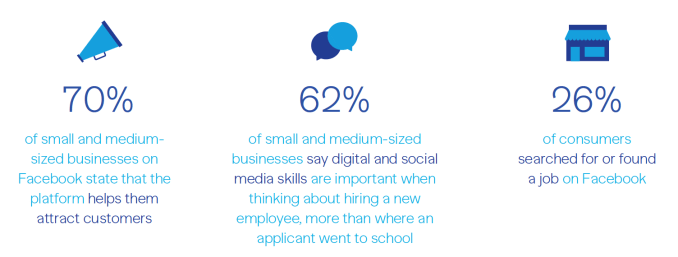Whether it’s to “bring the world closer together” or improve its public image, Facebook today announced Community Boost. Facebook tells me it’s investing tens of millions of dollars into the program that will travel to 30 cities around the U.S. in 2018. It will teach digital job skills to the unemployed, internet literacy to those just getting online, startup methodology to entrepreneurs and customer growth to small business owners.
Unsurprisingly, though, all these skills revolve around Facebook, which Facebook clearly thinks is the key to a better life. Stops on the tour include Houston, St. Louis, Albuquerque, Des Moines and Greenville, South Carolina — which are conspicuously all red states that voted for Trump in the 2016 election. Perhaps Facebook hopes to reduce unemployment that led to the dissatisfaction with current political systems which landed us Trump.
Facebook cites research by Morning Consult indicating “62% percent of US small businesses using Facebook said having digital or social media skills is an important factor in their hiring decisions — even more important than where a candidate went to school.” Houston Mayor Sylvester Turner says that “We’re happy to welcome Facebook to Houston to boost our residents’ digital skills and make sure our vibrant community of entrepreneurs and small businesses gets more out of the internet.”

The program might be perceived as less self-serving if Facebook had concentrated on teaching skills beyond it site, like how to make a good-looking resume or handle job interviews. So while the intention behind Facebook Community Boost might be honest, it’s tough to interpret it as altruistic while Facebook is amidst congressional hearings into election interference on its platform and is toying with the entire journalism industry as it sucks out ad dollars and jobs.
Here’s a look at Facebook’s plans for the program, with the parts where people learn to better use Facebook bolded.
-
If you’re looking for a job, we’ll provide training to help you improve your digital and social media skills. According to the research, 62% percent of US small businesses using Facebook said having digital or social media skills is an important factor in their hiring decisions — even more important than where a candidate went to school.
-
If you’re an entrepreneur, we’ll have training programs on how to use technology to turn an idea into a business or show you ways to create a free online presence using Facebook.
-
If you’re a business owner we’re going to offer ways your business can expand its digital footprint and find new customers around the corner and around the globe.
-
If you’re getting online for the first time or you want to support your community, we’ll provide training on digital literacy and online safety. And we’ll also help community members use technology to bring people together, with features like Events and Groups.
All that said, it’s hard to imagine any of the other tech giants like Google, Apple or Amazon pouring resources into something so directly tied to improving people’s socioeconomic mobility. Similar to Mark Zuckerberg’s 2017 challenge to meet people from every U.S. state that finished today in Missouri, you can either see it as just publicity, or as Facebook legitimately wanting to get out and hear from its constituency. Users can request Community Boost come to their city by filling out this form.
“One of the things I’m most proud of is that 70 million small businesses use Facebook to connect with customers,” writes Zuckerberg about today’s announcement. “That’s 70 million people who now have access to the same tools the big guys have. Now we need to make it easier for people to start and build new businesses or find jobs and opportunities, and in the process strengthen their communities.”

Facebook tells me it’s invested more than $1 billion into supporting small businesses since 2011 through programs like Boost Your Business classes, which teaches social media management, and the Blueprint online learning hub that 1 million businesses have looked to for social marketing skills. Facebook also is building a digital marketing curriculum to train 3,000 Michiganders in the next two years.
[Update: Facebook contacted me after I published this story to emphasize that “Facebook Community Boost will provide more than just training on Facebook.” One way it plans to do that is through partnerships with tech training schools for adults and coding bootcamps like Grand Circus in Michigan. These could help people go beyond basic social media skills and get actual computer science education.]
It will take a lot more to convince people Facebook is a benevolent force in the world. Even though its heart is often in the right place, Facebook has demonstrated an inability to predict the misuse and negative secondary impacts of its platform or do enough preemptively to prevent these problems. But if it wants to mend the rift in U.S. society, getting more people employed is a good start.

